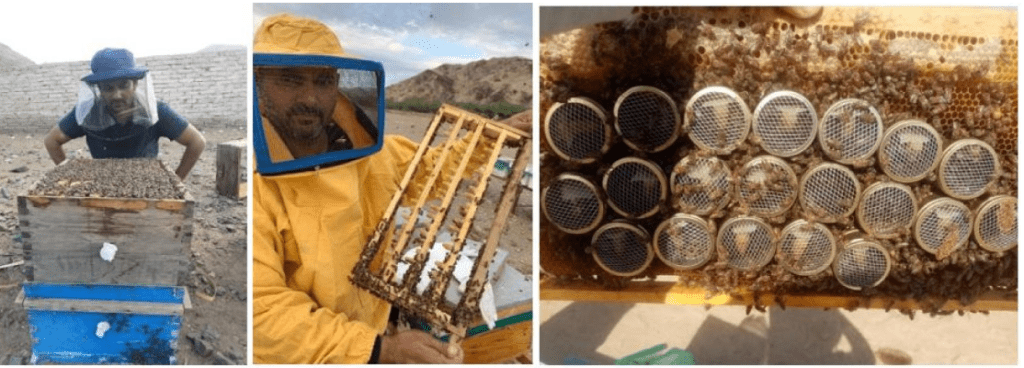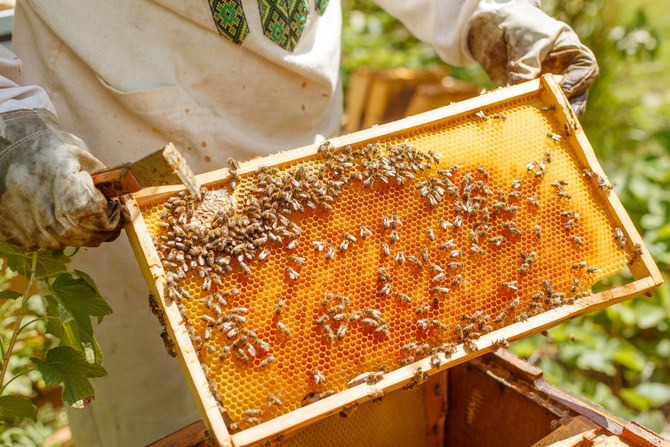Saudi Arabia has been taking significant strides to develop and sustain its honey production sector, tapping into the natural abilities of indigenous honey bee species to combat the challenges of the desert climate.
Their strategy is centered around sustainability, economic growth, and food security, aiming to bolster the honey industry and ensure long-term resilience in the sector.
Indigenous Honey Bees: Nature’s Resilient Pollinators


The backbone of Saudi Arabia’s honey industry is its indigenous honey bee, Apis mellifera jemenitica, a species uniquely adapted to the harsh desert climate.
These bees, known for their exceptional heat tolerance, are integral to the Kingdom’s agricultural sector, particularly in pollination, which is vital for crop production. According to studies, Apis mellifera jemenitica thrives in the intense heat, making it the perfect choice for local beekeeping efforts.
Boosting Honey Production for Saudi Arabia’s Vision 2030


As part of the Kingdom’s Vision 2030, Saudi Arabia is committed to increasing its honey production.
According to AGBI, the government has invested SAR 140 million ($37 million) to support the beekeeping industry under the Sustainable Agricultural Rural Development Program, known as Reef Saudi.
This program aims to double honey production to 7,500 tonnes annually by 2026, enhancing local output and decreasing reliance on imports.
With more than 10,500 workers employed in the beekeeping sector, the initiative not only supports food security but also contributes to job creation in rural areas.
This growth is reflected in the 41% increase in subsidized honey production since 2021, according to a publication by the Saudi Press Agency.
A Critical Link Between Honey Bees and Food Security


The importance of honey bees extends far beyond honey production. These pollinators play a critical role in the agriculture sector by helping crops flourish and contributing to food security.
As Saudi Arabia pushes forward with its agricultural goals, boosting honey production is viewed as a vital step in strengthening the nation’s food systems.
Pollination, largely driven by honey bees, is essential for ensuring a consistent and healthy food supply (according to official statements).
Preserving Native Bee Species: A Key to Sustainability
Preserving the native Apis mellifera jemenitica species is vital not only for maintaining a steady honey supply but also for sustaining biodiversity in Saudi Arabia.
The conservation of these bees ensures the pollination of local plants and supports the broader ecosystem, making it crucial for the long-term viability of the beekeeping industry.
A Growing Economic Sector



The honey industry in Saudi Arabia has emerged as an important economic driver. With over 5,000 tonnes of honey produced annually, the sector continues to grow and develop, aligning with the Kingdom’s vision of becoming self-sufficient in honey production by 2030, according to a report by the FAO.
As the country works to meet its production goals, the honey industry is poised to become a significant contributor to Saudi Arabia’s economy, diversifying the nation’s agricultural portfolio.
Saudi Arabia’s investment in its honey industry is not only about producing honey but about creating a sustainable and diversified agricultural future. The Kingdom’s commitment to enhancing local production, supporting its rural workforce, and ensuring food security through indigenous pollinators reflects a broader vision of economic transformation.
WE ALSO SAID: Don’t Miss… The Benefits of Organic Farming: A Look Inside Hazel Farm’s Agritainment Concept



